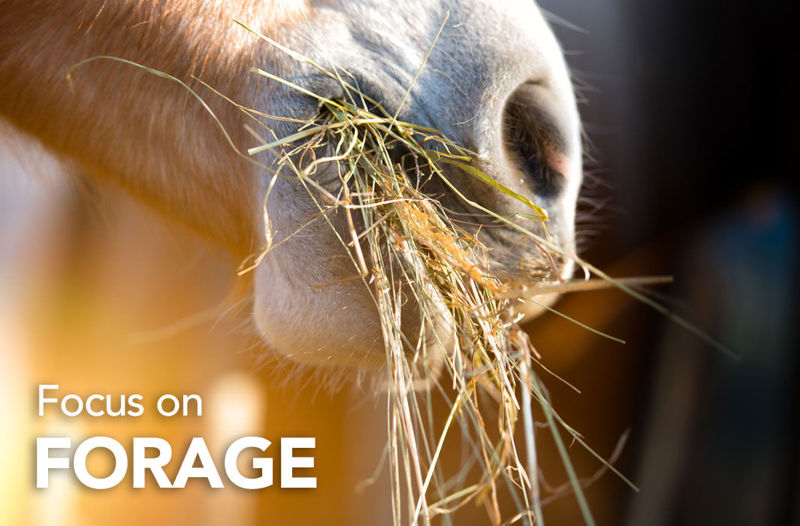Forage should form the basis of every horse’s diet, regardless of their individual nutritional requirements and workload. Horses have evolved to graze and should spend at least 16 – 18 hours grazing per day, which includes eating hay or haylage if access to grass is not possible for this amount of time.
Forage is important for the horse's physiological and psychological welfare. Horses have a natural drive to chew and if there isn’t enough forage provided, horses will redirect this chewing behaviour elsewhere, which could end up manifesting as wood chewing or crib biting. The physiological need for fibre is to provide the majority of the calories that the horse requires on a daily basis, along with ensuring that food moves through the digestive system as well as to prevent gas bubbles and twisting of the intestines.
Horses only produce saliva when they chew and saliva is a very important part of the digestive process. Not only does saliva help to move food through the digestive system but also helps to buffer the stomach acid, helping to maintain a stable pH and reducing the risk of gastric ulcers.
Forage is not only important for supporting gastric health, but also great for the hindgut. It provides a food source for the horse’s hindgut bacteria. The hindgut bacteria produce vitamins and hormones and helps to support immune function. Forage also helps to trap water in the hindgut which keeps your horse hydrated as well as providing them with a source of electrolytes.
Horses need to eat around 2 – 2.5% of their bodyweight in forage per day but horses that need to gain weight can eat up to 3% or more. At the other end of the scale horses that need to lose weight can be restricted to 1.5% of their bodyweight to control calorie intake (N.B. you should never feed below 1.5% of bodyweight in forage unless under veterinary supervision).
To help calculate how much your horse requires; if your horse doesn’t need to lose or gain weight you can feed 2 -2.5kg of forage per 100kg of your horses’ bodyweight. For a 500kg horse this equates to 10 – 12.5kg of forage per day. However, you also need to consider the dry matter content of the forage that you are feeding. Grass, hay and haylage all have very different moisture levels which will affect their dry matter content. Hay has a dry matter content of around 85-95%, where as haylage can have a dry matter content as low as 50 -70%. Grass contains a lot of moisture and therefore has a much lower dry matter content - as low as 30%. It is important to consider the dry matter content of the forage that you are feeding to ensure that enough fibre is being provided. For example, if you are feeding haylage, you would need to feed 13 -15kg for a 500kg horse, depending on the moisture content, per 24-hour period to meet 2% of your horses bodyweight.
One of the most common feeding mistakes is not feeding enough forage to your horse. Signs that your horse is not getting enough forage include weight loss, digestive issues, and behavioural issues. If you are noticing any of these signs, ensure that you are feeding an appropriate amount of forage before making any other changes to your horse’s diet.
If you need help calculating how much forage your horse needs please get in touch with our nutritionist.












